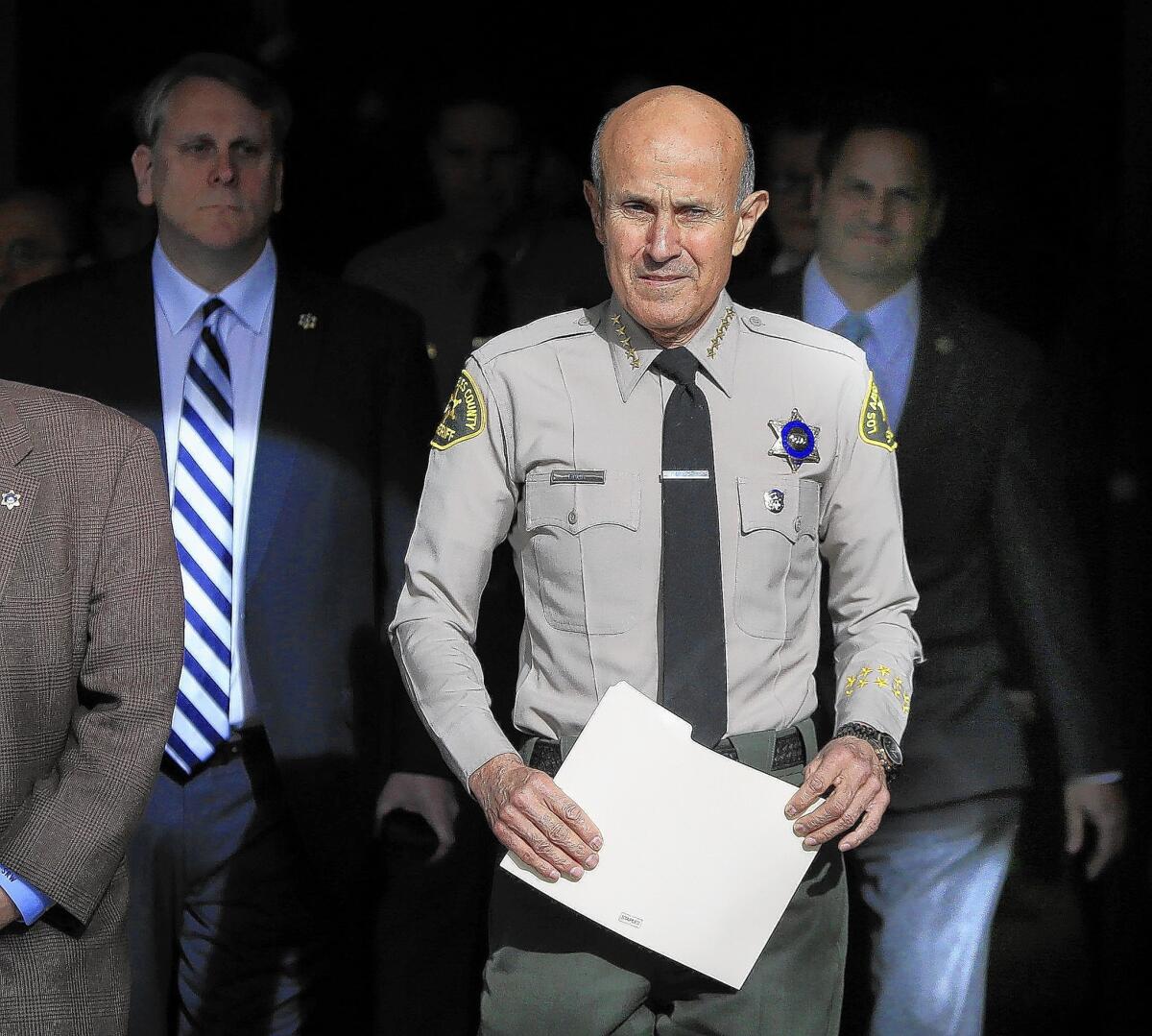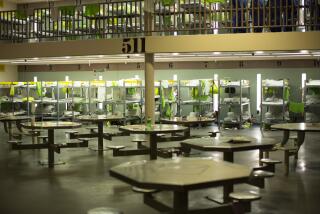Then-Sheriff Baca was involved in response to FBI phone, witness says

- Share via
After a jail inmate was discovered with an FBI-provided cellphone, Sheriff Lee Baca became a hands-on manager, convening high-level meetings, ordering up a criminal investigation and authorizing the inmate’s transfer to another jail, Lt. Stephen Leavins testified in federal court on Friday.
Leavins is one of six Los Angeles County sheriff’s officials being tried on obstruction of justice charges on allegations of hiding the inmate from the FBI and threatening an FBI agent with arrest. The trial of another sheriff’s deputy in a related case ended in a hung jury last month.
Defense attorneys have attempted to portray their clients as underlings following orders from above. Leavins and another lieutenant, Gregory Thompson, are the highest-ranking officials charged in the case.
After the phone was discovered and linked to the FBI, Baca called a Saturday meeting in the fourth-floor conference room at the Sheriff’s Department headquarters, Leavins testified.
Attendees at the August 2011 meeting included Undersheriff Paul Tanaka, Capt. William “Tom” Carey and several others, Leavins said. Baca, who led the meeting, ordered his staff to launch a criminal investigation into the cellphone as well as to safeguard the inmate, Anthony Brown, Leavins said.
Leavins testified that when he interviewed Brown, the inmate raised numerous allegations of brutality by sheriff’s deputies.
Those same types of allegations had led FBI agents to bribe a corrupt deputy to provide Brown with the cellphone. To sheriff’s officials, the phone was dangerous contraband that could be used by inmates to smuggle drugs or threaten witnesses.
“A cellphone in the hands of someone with nothing to lose who desires to go free is dangerous,” Leavins testified. “Desperate people in custody should not have unmonitored conversations with the outside.”
Leavins testified that as a supervisor in the Internal Criminal Investigations Bureau, he began his own probe into Brown’s brutality allegations. He said he also feared that Gilbert Michel, who later admitted smuggling the phone to Brown, was not the only corrupt deputy working at Men’s Central Jail.
Brown said that the FBI had provided him with drugs, including marijuana, methamphetamines and cocaine, to peddle in jail, Leavins testified.
Charges were eventually brought against 21 sheriff’s officials in connection with the FBI’s jail investigation, including the seven charged with obstruction of justice. The federal investigation is ongoing. Tanaka and Carey, who both testified earlier in the trial, are subjects of that probe. Baca retired suddenly in January, and Tanaka is running to replace him as sheriff.
On the witness stand, Tanaka said he remembered few details about the effort to protect Brown and find out how the phone got into the jail. But Leavins testified Friday that several key meetings took place in Tanaka’s office.
Initially, fearing that inmates or deputies might harm Brown, Leavins moved the informant to the hospital ward at Men’s Central Jail.
To decide where Brown should go next, a meeting was held in Tanaka’s office, with Baca, Tanaka, Carey and Leavins present, Leavins testified.
Baca gave the order, Leavins said: “He ordered me to relocate Anthony Brown safely and approved that location to be a jail station.”
Brown was sent to the San Dimas Sheriff’s Station, which was quiet, had empty cells and was fairly modern, Leavins said.
Leavins said he was not involved in booking Brown under various aliases but “didn’t disagree” with the decision.
“It was yet another layer of safety for Anthony Brown, so corrupted cops couldn’t go on a computer, find his name and arrange for some kind of intimidation or retaliation,” Leavins testified.
Leavins said he attended a meeting on Sept. 26 in Tanaka’s office with Tanaka, Baca and Carey. Baca instructed his staff to approach Leah Marx, an FBI agent involved in the cellphone operation, at her home and interview her, Leavins testified.
Leavins in turn authorized two of his sergeants, Scott Craig and Maricela Long, who are now among the defendants in the case, to “make contact” with Marx by clearly identifying themselves and speaking to her outside her home. The criminal indictment accuses Craig and Long of intimidating Marx and falsely informing her that they were obtaining a warrant for her arrest.
Prosecutors were beginning their cross-examination of Leavins on Friday when the trial recessed for the week.
Leavins will continue on the stand Tuesday, with Craig and Long also expected to testify.
More to Read
Sign up for Essential California
The most important California stories and recommendations in your inbox every morning.
You may occasionally receive promotional content from the Los Angeles Times.














